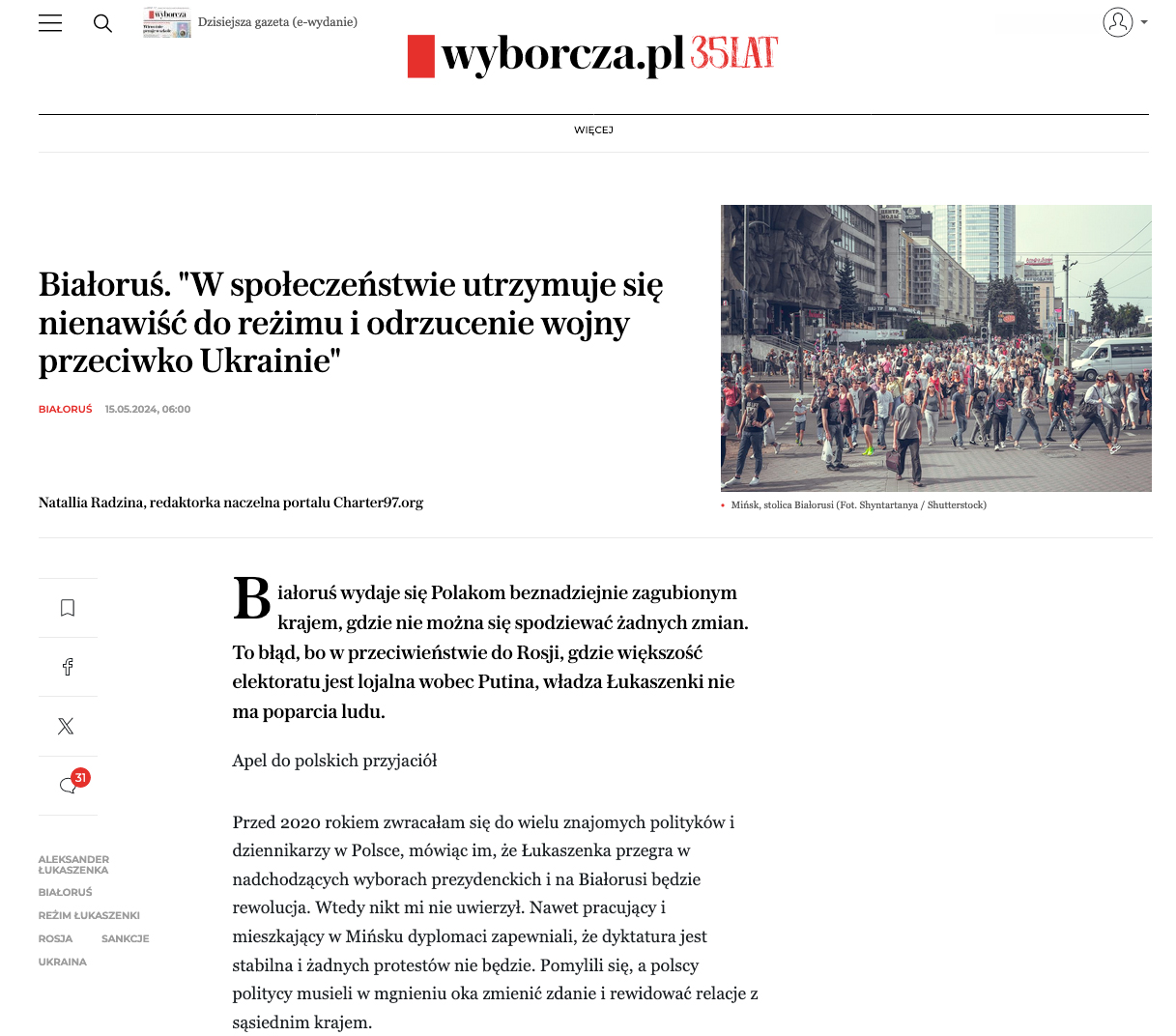Natallia Radzina In Gazeta Wyborcza: Belarus Will Be Free!
11- 16.05.2024, 12:01
- 13,586

The article by the Editor-in-Chief of Charter97.org was published in a leading Polish publication.
"Hatred of regime and opposition to war in Ukraine is still prevailing in Belarusian society," is the title of the article in Gazeta Wyborcza by Natallia Radzina, the Editor-in-Chief of the Charter97.org website.
The Belarusian journalist believes that changes in Belarus are inevitable. In her article, she calls on the Polish authorities to increase sanctions pressure on the Lukashenka regime and to help Belarusian civil society and the media.
Charter97.org publishes English translation of the article:
“On the eve of 2020, I told many politicians and journalists I knew in Poland that Lukashenka would lose the upcoming presidential election, and there would inevitably be a revolution in Belarus. No one believed me then. Even diplomats working and living in Minsk assured me that the dictatorship was still stable and there would be no protests in the country. They were mistaken, and politicians had to volte-face and rush to rebuild relations with the neighboring country.
Now I see in Polish society about the same mood as on the eve of the 2020 revolution events. Belarus seems to the Poles to be some hopelessly lost land, which is under the complete influence of Moscow, and no changes can be expected there.
So, I want to say again that this is a mistake, because changes in Belarus are inevitable. Unlike Russia, where the situation is much more complicated because of the loyalty of the majority of the electorate to the regime of Vladimir Putin, in Belarus the government of Aliksandr Lukashenka does not have the support of the people. Yes, the dictator still keeps the power, but only thanks to the military and financial support from the Kremlin. This support is by no means guaranteed in the future, because Russia is forced to spend huge resources to wage war in Ukraine.
Belarusians remained the same, the same as in the footage that flew around the world in 2020 – the European people craving for freedom. Unfortunately, protests under totalitarianism and the actual Russian occupation in the country are still impossible, but hatred of the illegitimate regime and complete rejection of the war against Ukraine remain in society.

Today, the Western policy towards Belarus is coming to the fore, and it is this policy that is crucial.
I have been working as a journalist for more than 25 years and I remember well all the periods of warming and cooling of Lukashenka's relations with the West. Unfortunately, Western policy towards my country has always been based on the principle "what's old is new again". After almost every presidential election, which the dictator shamelessly falsified, and subsequent mass repressions, sanctions were imposed. As a rule, they were insufficient and were rather symbolic: for example, visa restrictions for officials and employees of punitive bodies. A year or two later, the maximum was announced that "sanctions do not work" and it is still necessary to contact the government in order to "pull" Lukashenka away from Moscow and force him to go for some liberalization.
As a rule, this did not have any impact on the political situation inside the country, although Western politicians constantly declared their support for democracy and freedom in our country. But what really developed as a result of these contacts was trade, which, taking into account the happy geographical position of Belarus, was in full swing. We all remember well how actively Western goods went to Russia through the territories of Belarus since 2014, despite the sanctions imposed for the occupation of Crimea and Donbas, how large were the volumes of Polish products going to Belarus. The lack of democracy and political repression could in no way prevent this flourishing economic cooperation.
But the year 2020 came and it seemed that the monstrous lawlessness that Lukashenka arranged, having cracked down on peaceful protesters in front of the whole world, would put an end to the indecision of Western politicians, that really strong economic sanctions would be introduced that would help to destroy the dictatorship. However, the first economic restrictions against the regime were too late: the first real sanctions (visa restrictions do not matter) were introduced only in May 2021, when Lukashenka committed a direct terrorist act by landing an international airline plane in Minsk for the arrest of a blogger on board. But civil protests were already suppressed, and thousands of people were thrown in Belarusian prisons for political reasons.
Subsequently, economic restrictions against the regime were imposed for the so-called migration crisis and the regime's planned attacks on the borders with Poland, Lithuania and Latvia, and, finally, in 2022, when Russian troops entered Ukraine from the territory of Belarus and rocket attacks on Ukrainian cities began.
Today, it is important for Western politicians to draw conclusions from the mistakes of the past and develop an effective strategy towards Belarus. No negotiations with the dictator are possible. Lukashenka is so weak and dependent on Putin that he has lost the opportunity to make any independent policy. Also, the 2020 events and mass protests against one more election fraud made him scared that only the naive one can count on any easing of political repression inside the country. The victory of Ukraine in the war, which he has been waging together with Putin for the third year, as well as the consolidated strong policy of the West, can destroy him.
Only powerful economic sanctions, strict adherence to the restrictions imposed, blocking all ways of circumventing these sanctions by private companies and third countries can seriously affect the destructive processes that are already taking place in Belarus.
In no case should sanctions on Belarusian potash be lifted – the main Belarusian export product, citing a hypothetical famine in African countries. There will be no famine in Africa, there will be enough world reserves of this fertilizer, but a war against Poland as a result of strengthening the pro-Russian puppet regime in Minsk will be quite likely. I think it is worth recalling that on the eve of a full-scale war, Ukraine set records in trade with Belarus, buying great amounts of both oil products from Belarusian refineries and potash and nitrogen fertilizers, although after 2020 we needed Ukrainian solidarity so much, it was so important not to finance this terrorist regime. As a result, the monster, saturated with Ukrainian resources, attacked and this led to huge human casualties.
In addition to sanctions, which need to be strengthened, it is important, in my opinion, to support Belarusian independent media and human rights organizations. Bringing independent information to Belarusians within the country and supporting political prisoners are the most important areas of work for the Belarusian democratic forces. Poland has long been a hub and refuge for Belarusian independent media, because its proximity to Belarus allows it to work most effectively. I am the Editor-in-Chief of the Charter-97 website, and it has always been and will always be grateful to Poland for the opportunity to work freely for our country. We will always be grateful for the assistance provided by the Polish government and foundations, but it is extremely important not to reduce this assistance, but to increase it, because the importance of the work of independent Belarusian journalists is enormous. Belarusian society is under such pressure of criminal Putin and Lukashenka propaganda that a free independent word is simply necessary for people to keep a clear mind and understand the prospects for the future – Belarus should be European, of course.
I believe that Belarus will become free. I'd like to ask you, dear Polish friends, to believe as I do. Don't turn away from Belarusians. Our path is not easy, but I am convinced that, like the Poles, we will achieve our goal — to live in a free and independent country. We only need solidarity, the very world-famous Polish Solidarity, which has always been an example for us. This is what we stand for, this is our common support, our common cause (nasza rzecz pospolita).”
Natallia Radzina, the Editor-in-Chief of Charter97.org











